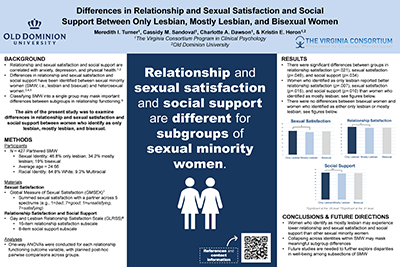College
College of Sciences
Department
Psychology
Graduate Level
Doctoral
Graduate Program/Concentration
Virginia Consortium Program in Clinical Psychology
Publication Date
2023
DOI
10.25883/bzeh-cv61
Abstract
Research suggests relationship and sexual satisfaction and social support are correlated with components of well-being such as anxiety, depression, and physical health. Differences in relationship and sexual satisfaction and social support have been identified between sexual minority women (SMW; i.e., lesbian and bisexual) and heterosexual women. However, classifying SMW into a single group may mask important differences. Further research is needed to better understand the differences in relationship and sexual satisfaction and social support between subgroups of SMW. Thus, the purpose of the present study was to examine differences in these constructs between women who identify as only lesbian, mostly lesbian, and bisexual. Participants were 427 partnered sexual minority women (Mage = 24.66; 84.8% White; 46.8% only lesbian; 34.2% mostly lesbian; 19% bisexual) recruited from social media to complete an online survey consisting of measures of relationship, health, and related factors as part of a larger study. A one-way ANOVA revealed statistically significant differences between only lesbian, mostly lesbian, and bisexual women in relationship satisfaction (p=.021), sexual satisfaction (p=.049), and social support (p=.034). Post-hoc pairwise comparisons revealed women who identified as only lesbian reported better relationship satisfaction (p=.007), sexual satisfaction (p=.015), and social support (p=.010) than women who identified as mostly lesbian. There were no differences between bisexual women and women who identified as either only lesbian or mostly lesbian. These findings identified important differences between subgroups of SMW, with women who identify as mostly lesbian reporting the lowest relationship and sexual satisfaction and social support. This study provides further evidence that collapsing across identities within the broad category of SMW may mask meaningful subgroup differences. Additional research is needed to further explore disparities in well-being among subsections of SMW. Findings may help identify important protective factors for mental and physical health and well-being specific to SMW of different identities.
Keywords
Sexual minorities, Relationship satisfaction, Sexual satisfaction, Social support
Disciplines
Clinical Psychology | Gender and Sexuality | Lesbian, Gay, Bisexual, and Transgender Studies
Files
Download Full Text (334 KB)
Recommended Citation
Turner, Meredith I.; Sandoval, Cassidy M.; Dawson, Charlotte A.; and Heron, Kristin E., "Differences in Relationship and Sexual Satisfaction and Social Support Between Only Lesbian, Mostly Lesbian, and Bisexual Women" (2023). College of Sciences Posters. 11.
https://digitalcommons.odu.edu/gradposters2023_sciences/11

Included in
Clinical Psychology Commons, Gender and Sexuality Commons, Lesbian, Gay, Bisexual, and Transgender Studies Commons


